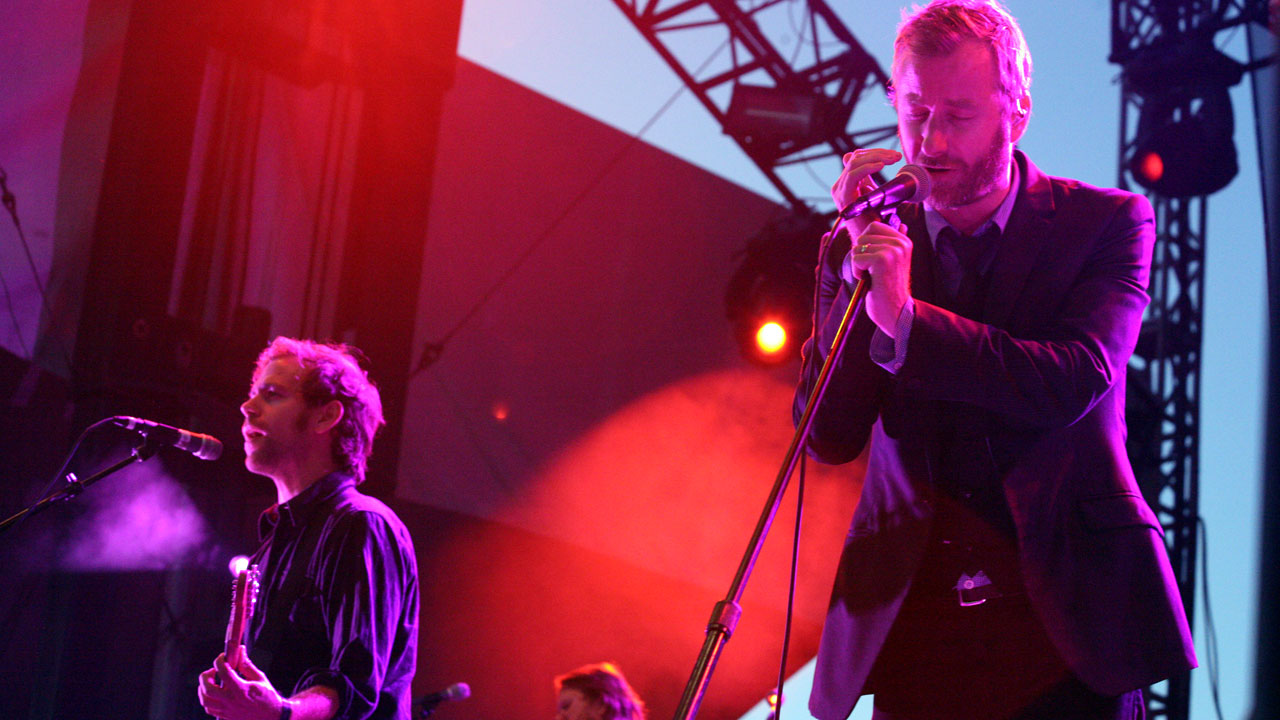FUV Essentials: Carmel Holt on The National

The National at Austin City Limits (photo by Laura Fedele)
Ask me to name my favorite song by The National (maybe "Apartment Story" or "Start A War" or "Vanderlyle Crybaby Geeks") or favorite album (Boxer or High Violet?) and I would have a hard time coming up with an answer. If you were to ask me why this band has become so important to music, I’d point to sheer staying power—it's been 15 years since their debut—and consistently high quality work. Or the extraordinary amount of respect and admiration I have for their incredible creative output.
In addition to their own albums, the Dessner brothers have curated several music festivals, produced albums for numerous artists, and have championed not only fellow musicians, but important social causes too, like Red Hot. Over time they have become a strong centrifugal force in the indie rock world, which has manifested in a somewhat unexpected way this year with a new compilation, curated by The National: Day of the Dead which features 60 indie bands and artists covering the Grateful Dead.
On a personal level, the strangest thing about The National's latest undertaking was what it brought into focus: why is this group essential to me?
It took quite a while for The National to become the indie-rock royalty they are today. It seems like it sneaked up on them and their fans, although it was earned early on. In truth, the only surprise is that it didn’t happen on a larger scale sooner. There is something about the arc of this band’s slow and steady growth that makes them all the more relatable and relevant to me and people my age, which falls somewhere between the Dessners and singer Matt Berninger.
The band grew at the same real life pace of non-rock stars, as we were all building our lives and careers. I'm hard-pressed to think of another example of a band that has been there, expanding and growing, as we cleared our 20s, moved into our 30s, and now 40s. The National has been side by side with us, as we navigate adulthood, a changing New York, and a rapidly changing world.
When everyone was moving to Brooklyn after college, the National were moving to that borough too. And now, as we start families and look for more space elsewhere, the National are moving out too. As the music we grew up on in the '80s and '90s matured into the new millennium, The National turned what we loved about those musical heroes into moody, big, intelligent, and sometimes enigmatic songs.
But that wasn’t what caught my ear.
Finding my own musical heroes was largely self-directed and even late by most standards. Classical music figured deeply into my background. My European, NPR-listening, intellectual parents played classical music almost exclusively at home and in the car. My musical training stayed that course, from age four until college, with piano lessons, school chamber choirs, vocal training, and theory and composition. Even when I got hooked on FM radio and classic rock, the Beatles were the only musical common ground I could find with my father, a classically-trained pianist.
My bedroom stereo, the record collections of my friends' parents, and my own car became my oasis away from the sometimes stifling world of notated and orchestrated music. I spent all of high school listening to music from the ‘60s and ‘70s — mostly the Grateful Dead.
It was in college that I realized how much modern rock I had to catch up on. In the meantime, the ‘90s were in full swing and alternative radio went from being a passion to a career. So when I first heard The National, the band brought everything together. Knowing that Bryce Dessner, a classical composer and arranger, was in this band made the lack of popular music in my childhood feel like less of a deficit. Instead, my perspective offered a window into what makes The National's sound so grand and sonically rich.
Now, many years later, a much different musical connection with The National has hit home: our mutual, abiding love for the Grateful Dead. The massive, six-hour, 59-track tribute album Day of The Dead is an unprecedented compilation. It took them four years to make it and it's their second collection to benefit the AIDS/HIV organization Red Hot. For the second time since discovering The National's music, something else clicked into place. My sometimes embarrassing, hippie-teenage-Deadhead past has found a comfortable coexistence with my indie-rock-loving present.
Hearing all of these old songs that I loved interpreted by many of my current favorite artists suddenly transformed my years of Jerry-worship into a point of pride. Yes, The National have made the Dead cool (and by proxy, my musical past too). Classical music and the Grateful Dead feels integrated with where I am today.
I recently made a move back home to the Hudson Valley, now splitting my time between New York City and my beloved Catskill Mountains. When I met Aaron Dessner to talk about the Day of the Dead project, I learned that much of the project had been recorded at Dreamland Studios in Woodstock where I once worked, just out of college. Dessner recently made the same decision that I had and left Brooklyn: he sold his Ditmas Park home and now-storied studio in favor of the bucolic surroundings of the Hudson Valley. Most of the band is now dispersed and out of Brooklyn with their wives and kids. It makes sense. It's what so many of us are doing at this stage of our lives.
And what a long, strange trip it’s been.

